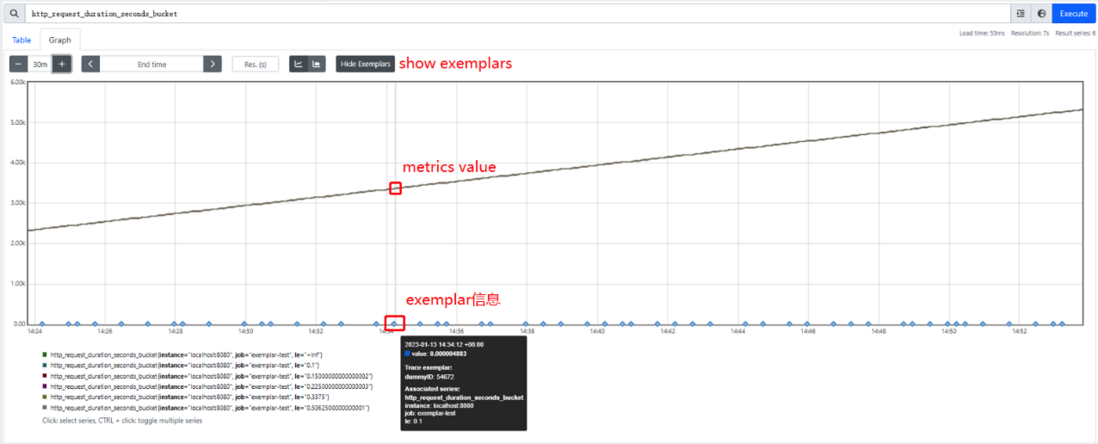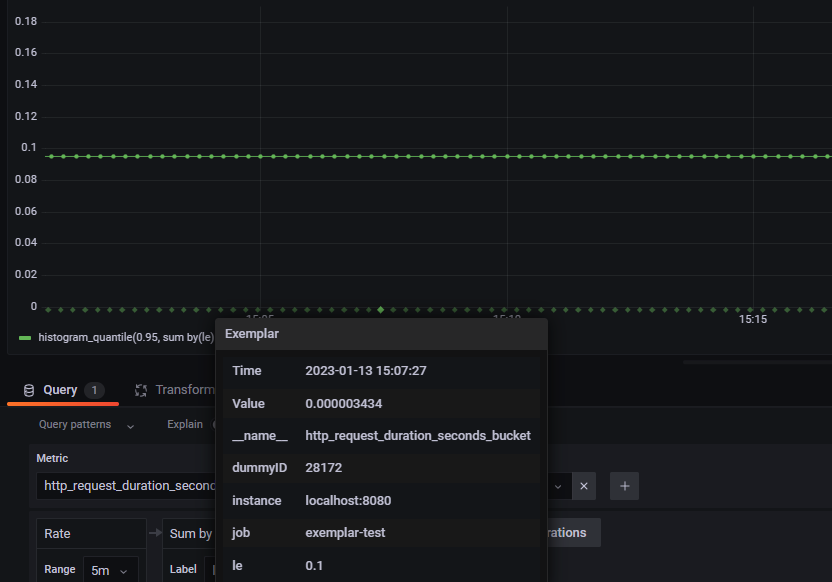一. exemplar是什么
exemplar译为“样本”、“范例”。
exemplar最早被用在Google的StackDriver中,后面成为了 OpenMetrics 标准的一部分,即: 可以为metrics额外增加属性。
典型应用是为metrics添加trace信息,这样metrics和tracing就可以关联起来。
OpenMetrics introduces the ability for scrape targets to add exemplars to certain metrics.
Exemplars are references to data outside of the MetricSet. A common use case are IDs of program traces.
目标对象通过 /metrics 接口暴露metrics 和 exemplar信息,prometheus在 pull 时,会一起拉取并保存。
prometehus支持对exemplar的采集和存储,启动时需要额外增加参数:
--enable-feature=exemplar-storageprometheus中exemplar对象的定义:
- 跟普通的metrics类似,由t/v、labels组成;
// Exemplar is easier to use, user-facing representation of *dto.Exemplar.
type Exemplar struct {
Value float64
Labels Labels
// Optional.
// Default value (time.Time{}) indicates its empty, which should be
// understood as time.Now() time at the moment of creation of metric.
Timestamp time.Time
}二. client侧暴露metrics和exemplar
对于metrics,一般使用prometheus/client_go增加自己的指标;
prometheus/client_go同样支持暴露自己的exemplar,故我们用prometheus/client_go编写client。
以application中最常见的http_request_duration_seconds指标为例:
- 定义Histogram类型变量:requestDurations;
使用requestDurations.ObserveWithExemplar()更新变量的值:
- value = time.Since(now).Seconds()
- lables = { "dummyID": rand.Int(100000) }
requestDurations := prometheus.NewHistogram(prometheus.HistogramOpts{
Name: "http_request_duration_seconds",
Help: "A histogram of the HTTP request durations in seconds.",
Buckets: prometheus.ExponentialBuckets(0.1, 1.5, 5),
})
go func() {
for {
// Record fictional latency.
now := time.Now()
requestDurations.(prometheus.ExemplarObserver).ObserveWithExemplar(
time.Since(now).Seconds(), // value
prometheus.Labels{"dummyID": fmt.Sprint(rand.Intn(100000))}, // labels
)
time.Sleep(600 * time.Millisecond)
}
}()http_handler中增加EnableOpenMetrics:true参数:
http.Handle(
"/metrics", promhttp.HandlerFor(
registry,
promhttp.HandlerOpts{
EnableOpenMetrics: true,
}),
)启动client,通过curl采集原始数据:
# curl -H "Accept: application/openmetrics-text" http://localhost:8080/metrics
# HELP http_request_duration_seconds A histogram of the HTTP request durations in seconds.
# TYPE http_request_duration_seconds histogram
http_request_duration_seconds_bucket{le="0.1"} 5006 # {dummyID="80815"} 4.097e-06 1.6735926303881307e+09
http_request_duration_seconds_bucket{le="0.15000000000000002"} 5006
http_request_duration_seconds_bucket{le="0.22500000000000003"} 5006
http_request_duration_seconds_bucket{le="0.3375"} 5006
http_request_duration_seconds_bucket{le="0.5062500000000001"} 5006
http_request_duration_seconds_bucket{le="+Inf"} 5006
http_request_duration_seconds_sum 0.02248467300000002
http_request_duration_seconds_count 5006可以看到,exemplar的信息与普通的metrics用#间隔,对于:
# {dummyID="80815"} 4.097e-06 1.6735926303881307e+09其中:
- {dummyID="80815"} 为labels;
- 4.097e-06 为value,即code中的time.Since(now).Seconds();
- 1.6735926303881307e+09 为timestamp;
三. prometheus拉取client的数据
使用prometheus采集client的metrics,然后就可以在prometheus UI上看到exemplar的信息
也可以将prometheus作为数据源,导入grafana查看:
参考:
1.https://vbehar.medium.com/using-prometheus-exemplars-to-jump-...
2.client-demo: https://github.com/prometheus/client_golang/blob/main/examples/exemplars/main.go
3.prometheus exemplar: https://prometheus.io/docs/prometheus/latest/feature_flags/#e...
4.OpenMetrics Specification: https://github.com/OpenObservability/OpenMetrics/blob/main/specification/OpenMetrics.md#exemplars


**粗体** _斜体_ [链接](http://example.com) `代码` - 列表 > 引用。你还可以使用@来通知其他用户。